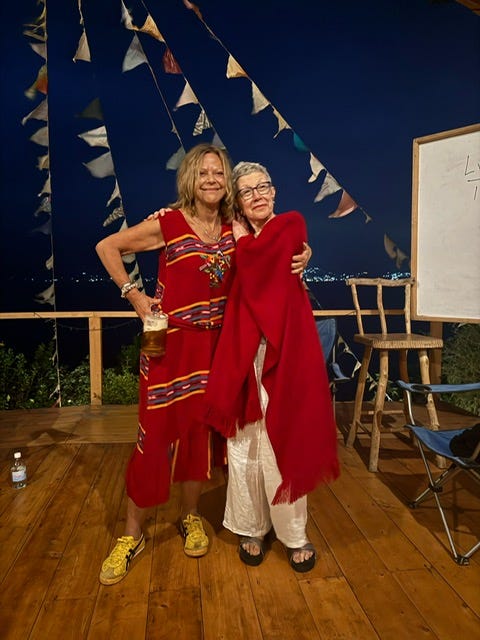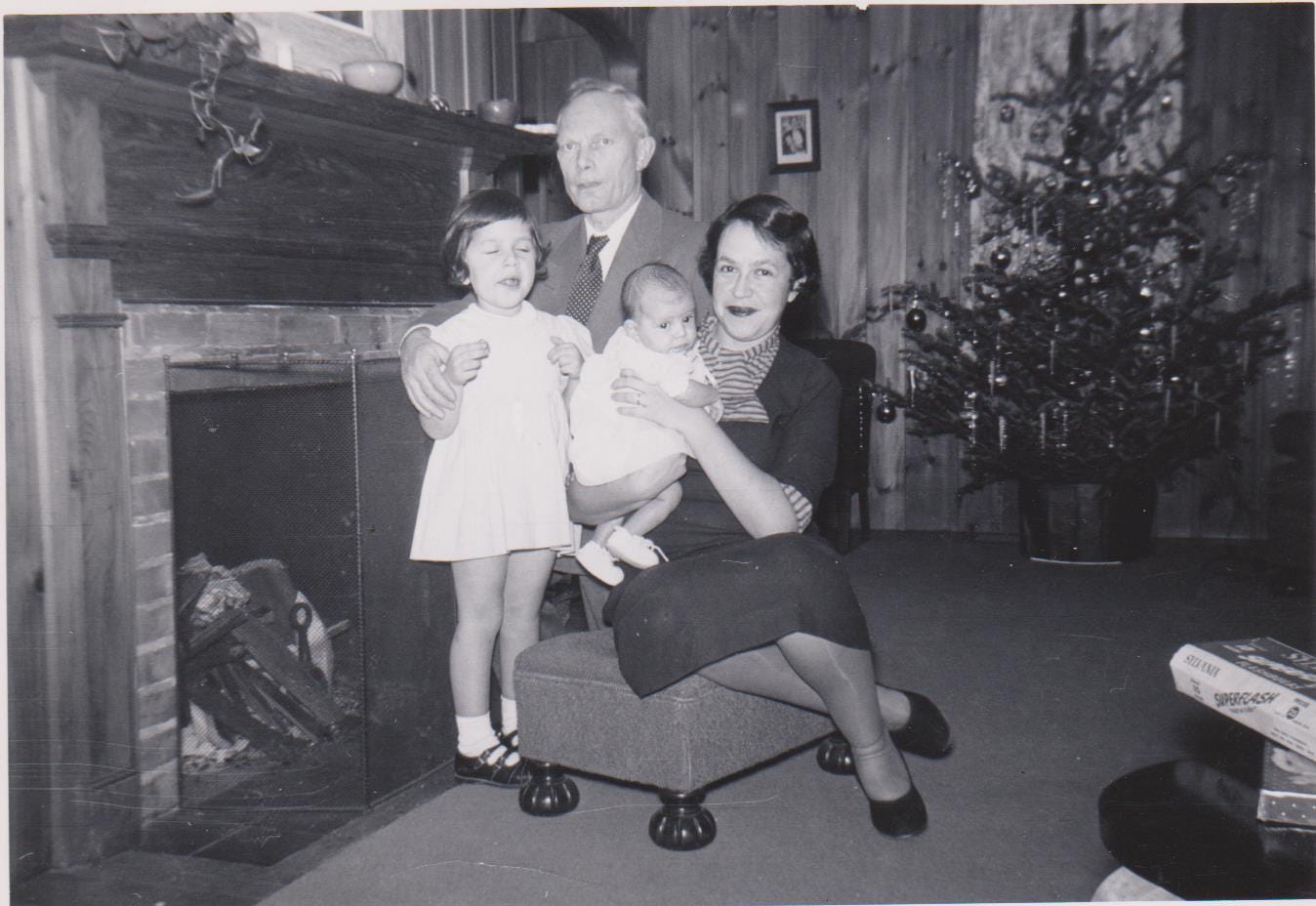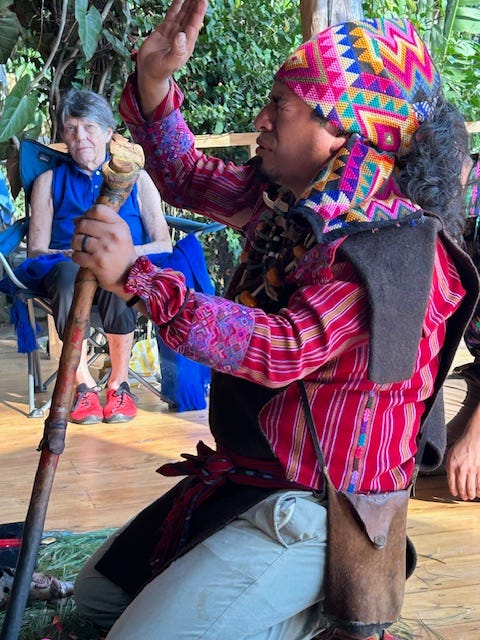Sister Act
My sister and I didn't speak for several years. Writing helped us mend the rift.
When my sister and I weren’t speaking, she never forgot my birthday. The same email arrived every year: “Dear r, happy birthday. I hope it was a good one. love, j.”
Thirteen words, two of them hardly words at all. Lowercase initials standing in for the conundrum each of us of us posed to the other. Did it hurt to type our names? Rona, to placate our mother’s Jewish mother, who opposed her marriage to a gentile with an ex-wife and bohemian ways. Joyce for our father’s late sister, who refused to be lost when other siblings either bridled at his drunken tirades or wondered how on earth he landed among the god-fearing Maynards.
Joyce and I are both writers, pushed to hone our craft from the moment we could hold a pencil. Our mother—journalist, author and literary hard-ass—taught us to write as if each word cost five cents (think five bucks today). A power word should not be buried in the middle of a sentence but given pride of place, like the emerald in a royal choker. Of Joyce’s 13 words, number 12 was “love.”
It gave me hope.
I spent last week at my sister’s lakeside home in Guatemala, her special guest at a writers’ intensive. In craft workshops for a dozen women, we riffed on each other’s insights, finished each other’s sentences and spoke each other’s names with delighted admiration. “Take it away, Rona!” “As Joyce was saying…” You should have heard our laughter.
We had taken different paths to the story fest. Joyce, the author of more than 20 books, has made her living as a writer since she was 18. I embraced writing after a long career as a magazine editor. When Joyce talks word craft, she performs every point—stamping her yellow-sneakered foot, waving her arms like the twin flags of story and language. I’m given to emphatic pauses. I only stamp my foot for one reason: a killer charley horse.
Yet neither of us would let a writer get away with dead language like “When my husband left me, I was devastated.” How exactly did you show your devastation? Did you leave a barrage of pleading voicemails? Burrow in your bed until your friends organized a search party? Slow down. Sink into the memory. Let it sting. If you don’t feel the heat of your own words, you can bet the reader won’t.
I was four when Joyce’s birth shattered me. With her cinnamon skin and melted-chocolate eyes, she held the family captive. They had let me name her Daphne for the mythical nymph who turned into a tree while escaping the lustful Apollo. But within hours of her arrival, I took the name back. If I couldn’t have my parents to myself, I would settle for my pride. My baby sister became Joyce, her middle name.
For 65 years and counting, she was the enchantress. I was the enforcer who laid down the law. Her full-tilt exuberance wore me out. (“You take up too much space,” I once said.) My self-containment looked to her like indifference. If each of us could have chosen the ideal sister, we’d have chosen an easier fit. Friends are the family of choice. With the family life gave you, it’s all about honoring the best in each other and letting go of everything else.
After Joyce and I gave our first craft talk, women asked how we mended the rift. One hadn’t spoken to her sister in years. What was our secret? Short answer: Time softened us. The research on sibling bonds has shown that conflict decreases with age while satisfaction flowers, especially after 60. At 75 and 71, both of us Maynard sisters have lost people we will miss forever—our parents; many friends; in Joyce’s case, a husband. Too soon, one of us will be mourning the other. Why not enjoy each other while we can?
Some siblings connect on the softball field, others in the kitchen or while hiking the Camino. Joyce and I connect through writing. When we were in our 50s, no longer estranged but not yet close, she pitched More, a women’s magazine that no longer exists, on a jointly written story about our ups and downs. The editor assigned us two facing essays, with one stipulation: We were not to share or discuss them until she had approved the copy. At desks a continent apart—hers in Mill Valley, California, mine in Toronto—we wrote our way to each other.
“Don’t write to settle scores,” we said in the craft talk. “Tell the truth, even when it doesn’t make you look good.” That’s what we both did in two essays as convincing and honest as any we have written. Reading Joyce’s, I finally saw myself through her eyes. I saw her frustration, but also her unquenchable love. Reading mine, she felt the same way. We recognized each other as well-intentioned humans doing the best we could with the skills we had and the familial anguish we carried. Joyce wrote in her essay, “So often, the story of my sister and me has been one of signals missed, of feelings registered but never expressed.” Writing took the padlocks off our tongues.
On the last night of the intensive, a shaman gave a ceremony for us. He prepared a sacred fire that consumed what we fed it, one by one. Fragrant herbs unknown to us. Seeds that nestled in our palms. Marshmallows emblazoned with tiny pink hearts. As he chanted in a Mayan language, an interpreter gave us the gist. “We should be grateful for our pain,” the shaman said. “It reminds us that we are human.”
As the sky grew dark, he invited us to introduce ourselves. Round the circle we went, bending over the fire to say our names and the names of those who gave us life. We followed a script, laced with honor and love. When Joyce’s turn came, she said, “I am Daphne Joyce, daughter of Fredelle and Max, and I honor and love them.” The flames leaped. Her long dress fluttered in a light breeze. We had traveled far from our hometown in New Hampshire. And here we were together, precisely where we belonged.
Have you run into trouble with a sibling—maybe even a full-blown estrangement? You’re not alone. Don’t be shy to speak up. We’re a friendly group, rich in life experience.
To learn more about Joyce’s workshops, click here. Writing groups are for women only; Spanish immersion (new this year) and Life by the Lake, for the curious traveler, are open to all. These groups fill up months in advance, so you’re wise to act now for 2026.
Every time you click the heart, leave a comment or share a post, you’re making it simpler for new readers to discover Amazement Seeker. Every paid subscription is an orchid at my door, a gift that brings the giver nothing but my gratitude and amazement. More amazement, to be precise. Writing for readers who value my words is pretty amazing in itself.








Oh, Rona! I love so much about this essay. It struck deeply at my heart. When I was a child, 4 years old, my brother was born. I had a different reaction than yours, I was thrilled. He was my baby. As we grew, he separated from me, to be with his peers, and told me to stop following him around! We went through a period of 2-3 decades where we were mostly estranged. I perceived him as selfish, arrogant, and aggressive. I stayed away. Was he those things? To some degree. But I never took the time to look at him more objectively, more compassionately. He grew up in a difficult family, too. But I was unable to see anyone else's suffering but my own. Since our father died in 2011, we've become increasingly closer, more intimate. Sharing our experiences of what it was like for each of us growing up in our parent's house. Recently we were talking about my perception of how great a big sister I was. He quickly disabused me of my fantasy. Humbling, for sure. He's done tremendous healing work, brave and painful, and I'm so proud of him. Sometimes I refer to him as my big little brother, I've learned so much from him of late. And yes, he's got quirks, and there are little things about him that I find irritating, but I've got my little brother back, and now he's a man. And I adore him. He's turning 60 this year, so yes, you're right. We've softened toward one another. We share a unique bond. We're the only ones who truly know what it was like to be Diane and Sid's kids. Love to you, so happy that your trip was good. Still wish I'd been there! xo
This is a little painful because my brother and I are estranged. He has a serious gambling addiction and completely wiped out our aging mother's savings. After years of trying to help him (first by giving him money - not advised, then various other ways), we just reached at dead end. Funny that you mention the now defunct More magazine because I wrote an article about this under a pseudonym years ago. I think this is the first time I openly acknowledge our rift and the reason for it.